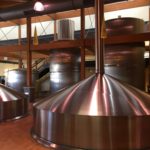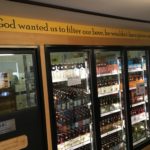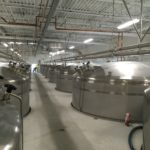Brewer’s Spotlight: John Mallett, Bell’s Brewery
Recently we sat down with John Mallett, Director of Operations at Bell’s Brewery in Kalamazoo, MI, to discuss transparent brewing, the importance of pure ingredients and how a “goofy” idea became an icon of the industry.
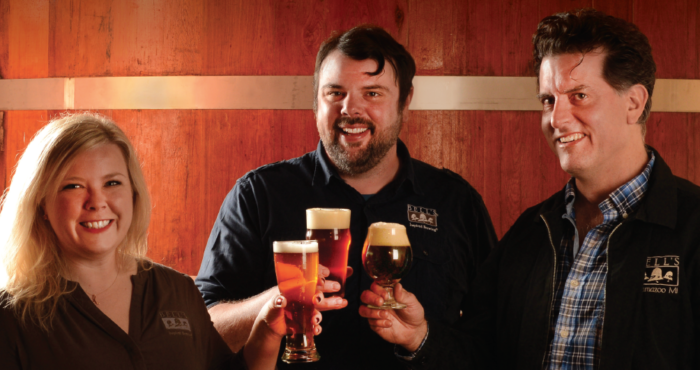
Our “Brewer’s Spotlight” is a series of conversations with innovative brewers across the country. Recently we sat down with John Mallett, Director of Operations at Bell’s Brewery in Kalamazoo, Michigan. John I. Haas is honored to be a trusted supplier of quality hops for Bell’s—and John, Laura Bell and Andy Farrell are currently featured in our “Here’s to the Moments” ad campaign. This month, we discussed transparent brewing, the importance of pure ingredients and how a “goofy” idea became an icon of the industry.
Q: You’ve worked at breweries all over the country. Why did you land at Bell’s?
Mallett: I’ve been brewing professionally for about 30 years and I’ve been at Bell’s for the last 15. Prior to coming to here, I was involved in brewery capital projects—I built breweries. Larry Bell asked me to come here to help build his brewery and…it just stuck. And really, it was the culture. We have an incredible focus on the morale of the people who are around us. We look at it daily. We embrace it and celebrate it. For me, a job is more than a job when, at the end of the day, you want to spend time with the people you work with.
Q: Is there a core philosophy at Bell’s, something that drives the brewing process?
Mallett: Bell’s beers, although innovative, are all very pure. I think the brewery is working at its best when we’re almost transparent—when somebody takes a beer and it’s like they can see through the brewery, back to the farms, back to the raw materials. We’re not monkeying around with them so much that you lose that essential goodness. The root of great beer is great raw materials: great barley malt, great hops, pure water, pure yeast. And if we can do our job so that those things shine through, we’re doing our best.
Q: Some people refer to Bell’s as the “House that Two Hearted” built. How did that beer come around, and what has it meant to the company?
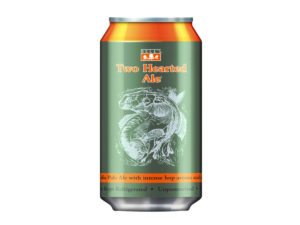 Mallett: We didn’t brew much of it, initially. If I’m formulating a beer, I really never say, you know we should only use one type of hops in this. The idea that we’d make a beer with 100% Centennial—which, at that time, was a pretty unknown and unused hop—was kind of goofy. But Two Hearted just showcases Centennial so well, with a really clean fermentation profile and a fantastic malt base behind it. Two Hearted has grown as the interest in this style has grown and it’s become kind of an iconic exemplar of IPAs. It hasn’t always been a great seller but it just seems like this slow, steady, quiet force that just keeps growing and growing.
Mallett: We didn’t brew much of it, initially. If I’m formulating a beer, I really never say, you know we should only use one type of hops in this. The idea that we’d make a beer with 100% Centennial—which, at that time, was a pretty unknown and unused hop—was kind of goofy. But Two Hearted just showcases Centennial so well, with a really clean fermentation profile and a fantastic malt base behind it. Two Hearted has grown as the interest in this style has grown and it’s become kind of an iconic exemplar of IPAs. It hasn’t always been a great seller but it just seems like this slow, steady, quiet force that just keeps growing and growing.
Q: Bell’s brews tons of varieties, how do you keep pushing innovation?
Mallett: From an innovation standpoint, we have the great opportunity to bring beers to our downtown brewpub. There’s a group of us that gets together on a regular basis, we talk about all our goofy ideas—some that may not be so commercially viable, but others of them certainly have legs. By making them downtown, we’re able to put them in front of people and sometimes you hear, “Don’t ever do that again.” But oftentimes, it’s more, “Hey, this really has merit.” We massage those beers, get them into fantastic shape, and then begin thinking about how we can bring them to a larger level. It’s a very iterative process.
Q: Are there any beers that surprised you because they didn’t make it?
Mallett: You know, I love to go to England; I love to drink the beer there, the crushable, sessionable, mild style. You’d think that would be a great beer here, and yet it’s never really gained traction in the United States. We play with those styles…it just doesn’t seem to work here.
Q: How do you think beer tastes are changing? Do you think the incredible interest in IPAs will last?
Mallett: I don’t know if there is a replacement for IPAs in the world. I do think that some of the bright flavor ingredients that you can get—sour malts and very bright citrus American hops—I think this is where we will continue to go. But IPA is stalwart. It’s beer that tastes like beer. I think back to the 70s when I was growing up and the beer was just light, or really, really light, and I don’t think we’re going back there.
Q: Are there any experimental hops that have caught your eye recently?
Mallett: We’ve been really interested in some of the new cultivars. Every year we go out to selection and we spend like five hours walking through the experimental fields just smelling everything, free-associating—it’s funny to hear some of the words and phrases we come up with to describe what we find. I got really excited about HBC 291, which we played with for a number of years. I was super excited when it came out as a named varietal, Loral™—and I think flavors like these will continue to be really exciting.



